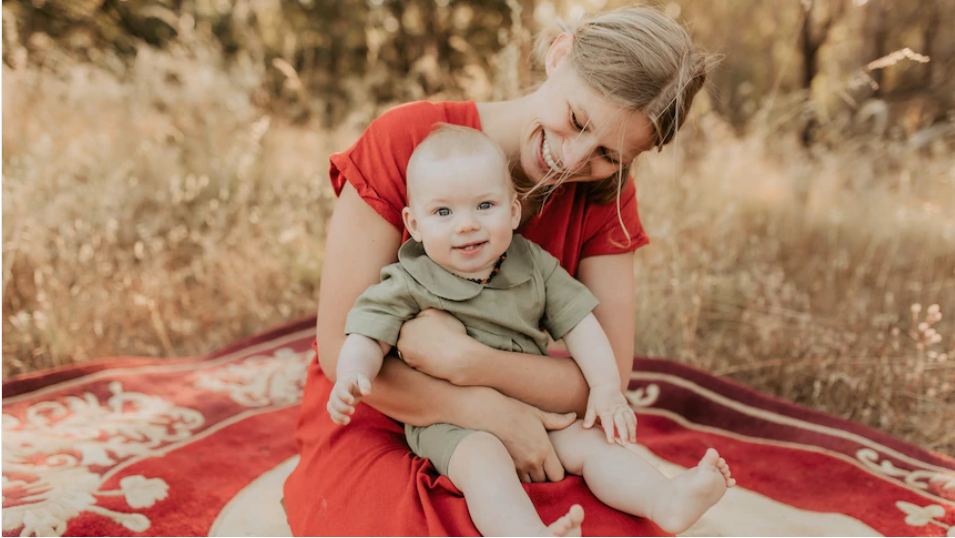ooking down at her newborn son, struggling to feel joy or even connection, Melissa Hocking felt completely alone.
She had first raised the alarm in the final months of her pregnancy, seeing a psychiatrist as her depression spiralled to frightening depths.
He urged her, as soon as she gave birth, to put as many safeguards in place as possible.
“He said, ‘You’ve got all the red flags for postnatal depression’,” Melissa said.
Baby Ollie was born in March last year.
The Shepparton mum immediately swept into action, signing up to every perinatal mental health service available in her region.
But the weeks passed.
Perinatal Anxiety and Depression Australia (PANDA) says postnatal mental illness affects up to one in five new mums and up to one in 10 new dads.
It is feared this has only worsened during the pandemic, with PANDA reporting a 42 per cent surge in calls to their helpline since 2019.
The organisation expects this high demand will only continue.
New data from the Centre of Perinatal Excellence (COPE) shows three out of four women struggling with anxiety or depression in the perinatal period do not seek help until they reach crisis point.
But while shame and stigma can play a major role, many parents claim there is a larger issue – access to care.
Victorian doula and registered midwife Steffie Watts says she has seen this on the ground.
“I don’t believe the problem is women not accessing the service, I believe the issue lies within the service itself,” she said.
“They are inundated, underfunded and consequently, they struggle to help everyone who needs it.”
‘It needs to get to a crisis point’
Afraid for the safety of her newborn son – and herself – Melissa tried repeatedly to admit herself to hospital, but was told home was the best place for her.
Melissa feels the lack of perinatal mental health care in her region is “an unspoken problem”.
“There’s not a mum I know that’s given birth in the past five years, who hasn’t needed some kind of mental support,” she said.
“From what I’ve seen, not one of them has been able to access it.
“To access help, it needs to get to a crisis point.”
‘I was falling between the cracks’
Shepparton’s Brittany Barnard fell pregnant in 2019.
With a history of anxiety, depression and an eating disorder, she was highly aware of her own vulnerabilities.
nowing Brittany would need specialised support, her care team referred her to the local perinatal emotional health program.
“But they deemed me inappropriate and too high-risk to participate,” she said.
“I felt like I was falling between the cracks.”
After a traumatic birth, Brittany struggled with intrusive thoughts about harming her baby – a common symptom of postnatal mental illness, from which she has since healed.
“There was definitely shame and stigma about it,” she said.
“But only because no-one talks about it, and there are no services available to talk about.”
Need for more mother-baby units
COPE’s Ariane Beeston said there was a desperate need for more mother-baby units across Australia, allowing for wrap-around care without separating the parent and child.
The centre believes there are about 10 public mother-baby units Australia-wide.
“They are very rare,” Ms Beeston said.
She accessed such a service in New South Wales 10 years ago, after being diagnosed with postnatal psychosis – a rare condition affecting more than one woman in every 1000.
“I had started to experience strong delusions,” she said.
“My son had developed a nappy rash and I became convinced that child protection were aware, and that they would remove him from my care.”
A decade on, Ms Beeston has recovered – and she wants other parents to receive the same care.
Shortage of care in regional areas
It’s an ongoing issue in regional areas, where parents can travel hours to access centres.
Shepparton is just one community that has been crying out for a mother-baby unit, with local state member Suzanna Sheed campaigning since the late ’90s.
In October 2020, the Victorian government announced seven early parenting centres – formerly known as mother-baby units – would be established across the state.
But Shepparton was excluded.
“We were very disappointed,” Ms Sheed said.
“I’m really hoping in this state budget coming up, it will be announced.”
Partners also impacted
Parents said there was also a major gap in support for dads and partners, who can also struggle.
Melissa witnessed this firsthand – her husband Nathan battled postnatal depression after their son Ollie was born.
“Treatment should involve the whole family,” she said.
“But all traditional practitioners want to work with you in isolation.”
COPE says if mothers experience postnatal mental illness, their partner is at increased risk.
“So new dads are trying to get their head around being a father and at the same time, in cases of severe mental illness, are having to be a carer as well,” Ms Beeston said.
“It can be difficult for dads to speak up, but it’s really important that they do.”
More focus needed on prevention
In addition to more treatment, there are calls for a greater focus on early prevention.
Ms Watts said this should include more time dedicated to antenatal appointments, and less intervention in labour and birth.
She also believed too many babies were being admitted unnecessarily to special care nurseries, increasing stress on parents and causing separation in the key bonding period.
“That just adds to it all,” she said.
Ms Beeston said social media was also emerging as a major driver for shame and stigma, and kept many parents from seeking help.
“They can end up feeling like a failure because they don’t live up to that expectation of what you think parenthood is supposed to be like,” she said.
“Many can fear others finding out that they’re not perfect and don’t have everything together.
“But there’s no such thing as a perfect parent.”











